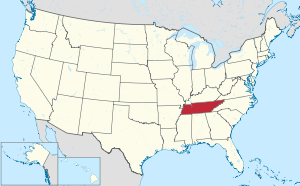
Back Tennessee Afrikaans ቴነሲ Amharic Tennessee AN Tennesīeg ANG تينيسي Arabic تينيسي ARY تينيسى ARZ Tennessee AST Tennessee suyu Aymara Tennessi Azerbaijani
Tennessee
ᏔᎾᏏ (Cherokee) | |
|---|---|
| State of Tennessee | |
| Nickname: The Volunteer State[1] | |
| Motto(s): Agriculture and Commerce | |
| Anthem: Eleven songs | |
 Map of the United States with Tennessee highlighted | |
| Country | United States |
| Before statehood | Southwest Territory |
| Admitted to the Union | June 1, 1796 (16th) |
| Capital (and largest city) | Nashville[2] |
| Largest metro and urban areas | Nashville |
| Government | |
| • Governor | Bill Lee (R) |
| • Lieutenant Governor | Randy McNally (R) |
| Legislature | General Assembly |
| • Upper house | Senate |
| • Lower house | House of Representatives |
| Judiciary | Tennessee Supreme Court |
| U.S. senators | Marsha Blackburn (R) Bill Hagerty (R) |
| U.S. House delegation | 8 Republicans 1 Democrat (list) |
| Area | |
| • Total | 42,181 sq mi (109,247 km2) |
| • Land | 41,235 sq mi (106,798 km2) |
| • Water | 909 sq mi (2,355 km2) 2.2% |
| • Rank | 36th |
| Dimensions | |
| • Length | 440 mi (710 km) |
| • Width | 120 mi (195 km) |
| Elevation | 900 ft (270 m) |
| Highest elevation | 6,643 ft (2,025 m) |
| Lowest elevation | 178 ft (54 m) |
| Population (2023) | |
| • Total | 7,126,489[4] |
| • Rank | 15th |
| • Density | 171.0/sq mi (65.9/km2) |
| • Rank | 20th |
| • Median household income | $58,516 (2,021)[4] |
| • Income rank | 41st |
| Demonyms | Tennessean Big Bender (archaic) Volunteer (historical significance) |
| Language | |
| • Official language | English |
| • Spoken language | Language spoken at home[6] |
| Time zones | |
| East Tennessee | UTC−05:00 (Eastern) |
| • Summer (DST) | UTC−04:00 (EDT) |
| Middle and West | UTC−06:00 (Central) |
| • Summer (DST) | UTC−05:00 (CDT) |
| USPS abbreviation | TN |
| ISO 3166 code | US-TN |
| Traditional abbreviation | Tenn. |
| Latitude | 34°59′ N to 36°41′ N |
| Longitude | 81°39′ W to 90°19′ W |
| Website | tn |
Tennessee (/ˌtɛnɪˈsiː/ ⓘ TEN-iss-EE, locally /ˈtɛnɪsi/ TEN-iss-ee),[8][9][10] officially the State of Tennessee, is a landlocked state in the Southeastern region of the United States. It borders Kentucky to the north, Virginia to the northeast, North Carolina to the east, Georgia, Alabama, and Mississippi to the south, Arkansas to the southwest, and Missouri to the northwest. Tennessee is the 36th-largest by area and the 15th-most populous of the 50 states. Tennessee is geographically, culturally, and legally divided into three Grand Divisions of East, Middle, and West Tennessee. Nashville is the state's capital and largest city, and anchors its largest metropolitan area. Other major cities include Memphis, Knoxville, Chattanooga, and Clarksville. Tennessee's population as of the 2020 United States census is approximately 6.9 million.[11]
Tennessee is rooted in the Watauga Association, a 1772 frontier pact generally regarded as the first constitutional government west of the Appalachian Mountains.[12] Its name derives from Tanasi (ᏔᎾᏏ), a Cherokee town in the eastern part of the state that existed before the first European American settlement.[13] Tennessee was initially part of North Carolina, and later the Southwest Territory, before its admission to the Union as the 16th state on June 1, 1796. It earned the nickname "The Volunteer State" early in its history due to a strong tradition of military service.[14] A slave state until the American Civil War, Tennessee was politically divided, with its western and middle parts supporting the Confederacy and the eastern region harboring pro-Union sentiment. As a result, Tennessee was the last state to secede and the first readmitted to the Union after the war.[15]
During the 20th century, Tennessee transitioned from a predominantly agrarian society to a more diversified economy. This was aided in part by massive federal investment in the Tennessee Valley Authority (TVA) and the city of Oak Ridge, which was established during World War II to house the Manhattan Project's uranium enrichment facilities for the construction of the world's first atomic bombs. After the war, the Oak Ridge National Laboratory became a key center of scientific research. In 2016, the element tennessine was named for the state, largely in recognition of the roles played by Oak Ridge, Vanderbilt University, and the University of Tennessee in its discovery.[16] Tennessee has also played a major role in the development of many forms of popular music, including country, blues, rock and roll, soul, and gospel.
Tennessee has diverse terrain and landforms, and from east to west, contains a mix of cultural features characteristic of Appalachia, the Upland South, and the Deep South. The Blue Ridge Mountains along the eastern border reach some of the highest elevations in eastern North America, and the Cumberland Plateau contains many scenic valleys and waterfalls. The central part of the state is marked by cavernous bedrock and irregular rolling hills, and level, fertile plains define West Tennessee. The state is twice bisected by the Tennessee River, and the Mississippi River forms its western border. Its economy is dominated by the health care, music, finance, automotive, chemical, electronics, and tourism sectors, and cattle, soybeans, corn, poultry, and cotton are its primary agricultural products.[17] The Great Smoky Mountains National Park, the nation's most visited national park, is in eastern Tennessee.[18]
- ^ "Tennessee adopts 'The Volunteer State' as official nickname". Nashville: WTVF-TV. Associated Press. February 10, 2020. Retrieved October 5, 2020.
- ^ Cite error: The named reference
commercialappeal0517was invoked but never defined (see the help page). - ^ "State Area Measurements and Internal Point Coordinates". US Census Bureau. Census Reference Files. 2010. Retrieved January 23, 2024.
- ^ a b c "QuickFacts Tennessee; United States". census.gov. United States Census Bureau, Population Division. April 1, 2020. Archived from the original on January 5, 2023. Retrieved May 18, 2023.
- ^ a b "Elevations and Distances in the United States". United States Geological Survey. 2001. Archived from the original on October 15, 2011. Retrieved October 24, 2011.
- ^ "Languages in Tennessee (State)". Statistical Atlas. Archived from the original on April 28, 2019. Retrieved August 6, 2019.
- ^ Ebert, Joel (February 24, 2016). "Barrett M82 sniper rifle becomes official state rifle". The Tennessean. Retrieved June 10, 2023.
- ^ "Definition of 'Tennessee'". Webster's New World College Dictionary (4th ed.). Houghton Mifflin Harcourt. 2010. Archived from the original on July 3, 2018. Retrieved July 2, 2018 – via Collins English Dictionary.
- ^ "Tennessee". Oxford Advanced American Dictionary. Oxford University Press. 2018. Archived from the original on July 3, 2018. Retrieved July 2, 2018.
- ^ Jones, Daniel (2011). Roach, Peter; Setter, Jane; Esling, John (eds.). "Tennessee". Cambridge English Pronouncing Dictionary (18th ed.). Cambridge University Press. p. 488. ISBN 978-0-521-15255-6.
- ^ "City and Town Population Totals: 2010–2019". 2019 Population Estimates. United States Census Bureau, Population Division. Retrieved June 16, 2020.
- ^ Finger 2001, pp. 46–47.
- ^ Bales, Stephen Lyn (2007). Natural Histories: Stories from the Tennessee Valley. Knoxville, TN: University of Tennessee Press. pp. 85–86. ISBN 978-1572335615 – via Google Books.
- ^ McCullough, Clay (April 26, 2018). "Why Tennessee is Called the Volunteer State". Culture Trip. Retrieved January 28, 2021.
- ^ "Tennessee's Civil War Heritage Trail" (PDF). The University of Southern Mississippi. Archived from the original (PDF) on March 26, 2010. Retrieved November 25, 2009.
- ^ "IUPAC Announces the Names of the Elements 113, 115, 117, and 118". International Union of Pure and Applied Chemistry. November 30, 2016. Archived from the original on September 23, 2018. Retrieved July 2, 2019.
- ^ Bertone, Rachel (November 20, 2013). "Tennessee's Top Five". Tennessee Home & Farm. Tennessee Farm Bureau.
- ^ "Great Smoky Mountains National Park". National Park Service. Archived from the original on December 2, 2009. Retrieved November 25, 2009.
Cite error: There are <ref group=lower-alpha> tags or {{efn}} templates on this page, but the references will not show without a {{reflist|group=lower-alpha}} template or {{notelist}} template (see the help page).
© MMXXIII Rich X Search. We shall prevail. All rights reserved. Rich X Search





